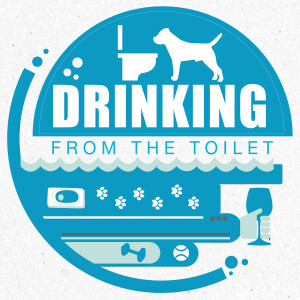
Drinking From the Toilet: Real dogs, Real training
Kids & Family:Pets & Animals

We talk about classical conditioning in dog training circles a lot, and I’ve been hearing the term CER more and more frequently in larger conversations, which is AWESOME.
Most people know that classical conditioning is one form of associative learning that makes up part of what we call learning theory.
And most recognize the name Pavlov, and know that he did some experiments a long time ago that involved some bells and some food and some drooling dogs.
But I think we can do a little bit better, because I am a big believer that the more we understand about a process, the better equipped we are to use that process to our advantage (lest it be used against us).
We can build a Conditioned Emotional Response to some, initially meaningless, stimulus or event, by pairing it with something that the dog already has a response to.
And that is how the clicker or other event marker is conditioned.
The click starts out as just some meaningless noise. Then by pairing it with food. The click starts to initiate food-like responses. And the more this happens, the stronger the response.
But what if the event or stimulus is not actually neutral... what if the dog already has some experience or association with that thing, and so it already has meaning (and what if it's a bad meaning).
That’s where counter conditioning comes in.
view more
More Episodes
#67: Settle Down
 2018-08-29
2018-08-29
 2018-08-29
2018-08-29
#66: Wait For It
 2018-08-17
2018-08-17
 2018-08-17
2018-08-17
#65: It's All Behavior
 2018-08-07
2018-08-07
 2018-08-07
2018-08-07
#64: Concept Training with Ken Ramirez
 2018-07-18
2018-07-18
 2018-07-18
2018-07-18
#63: Training for Duration
 2018-07-11
2018-07-11
 2018-07-11
2018-07-11
#62: Human Behavior Change With RYANO
 2018-07-03
2018-07-03
 2018-07-03
2018-07-03
#59: Balance with Alex Kurland
 2018-06-12
2018-06-12
 2018-06-12
2018-06-12
#58: Maximizing Food Drive
 2018-06-06
2018-06-06
 2018-06-06
2018-06-06
#57: Specific Reinforcement Cues
 2018-05-17
2018-05-17
 2018-05-17
2018-05-17
#55: Generalization In Dog Training
 2018-04-23
2018-04-23
 2018-04-23
2018-04-23
#54: Behavioral Momentum
 2018-04-17
2018-04-17
 2018-04-17
2018-04-17
#53: Puppy Thoughts
 2018-04-09
2018-04-09
 2018-04-09
2018-04-09
#52: Operationalize This
 2018-04-02
2018-04-02
 2018-04-02
2018-04-02
#51: Husbandry with Laura Monaco Torelli
 2018-03-12
2018-03-12
 2018-03-12
2018-03-12
#50: Frustration Tolerance
 2018-03-07
2018-03-07
 2018-03-07
2018-03-07
#48: Setting Priorities
 2018-02-19
2018-02-19
 2018-02-19
2018-02-19
012345678910111213141516171819
Create your
podcast in
minutes
- Full-featured podcast site
- Unlimited storage and bandwidth
- Comprehensive podcast stats
- Distribute to Apple Podcasts, Spotify, and more
- Make money with your podcast
It is Free
- Privacy Policy
- Cookie Policy
- Terms of Use
- Consent Preferences
- Copyright © 2015-2024 Podbean.com





